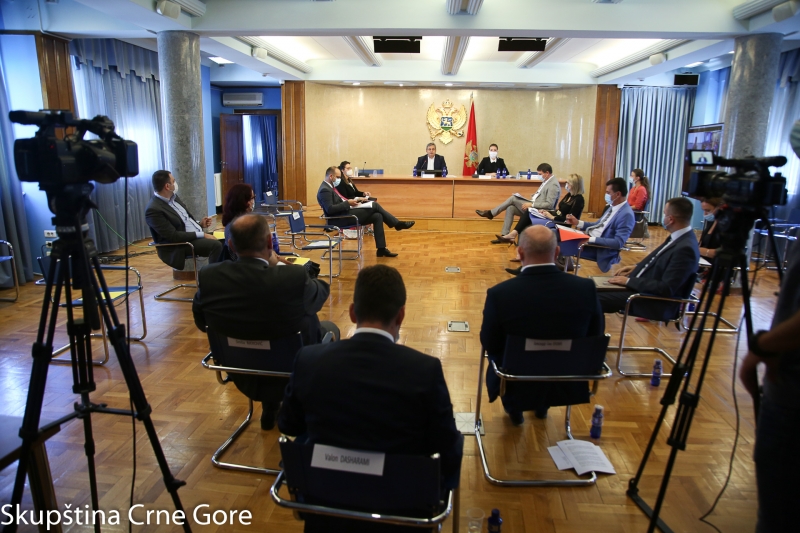At its 41st meeting held today, the Committee members discussed the status of accession negotiations in chapters 23 - Judiciary and fundamental rights and 24 - Justice, freedom and security, commenting the findings of the European Commission’s Non-Paper, adopted in June of the current year.
The meeting was attended by: Aleksandar Drljević, Montenegro's Chief Negotiator with the EU; Ms Marijana Laković-Drašković, Negotiator for chapters 23 and 24 and Director General of the Directorate for Organisation of Judiciary, Criminal Legislation and Supervision at the Ministry of Justice; on behalf of the Ministry of Interior Mr Dragan Pejanović, State Secretary and Ms Tanja Ostojić, Head of the Working Group for Chapter 24; on behalf of the Police Administration Mr Enis Baković, Assistant Director for the Criminal Police Sector and Ms Selma Mehović, Coordinator for International Police Cooperation; Mr Siniša Bjeković, Protector of Human Rights and Freedoms; on behalf of the Ministry of Human and Minority Rights Mr Aleksandar Saša Zeković, State Secretary and Secretary Mr Valjon Dašarami; on behalf of the Agency for Prevention of Corruption, Assistant Director Mr Savo Milašinović. Representatives of the responsible institutions referred to the assessments of the European Commission, each one in the domain of their responsibilities.
It was noted that the latest assessments of the European Commission were more specific and precise, although the Committee members had interpreted them differently. The participants agreed that the document contained clear recommendations, as further guidelines and incentives for the continuation of reforms and negotiations in this area. They voiced the expectation that, within the current German presidency of the Council of the EU, the enlargement policy would be high on the European agenda, welcoming the interest of German officials in the developments in the Western Balkans. The importance of political dialogue in parliament was highlighted, especially in the context of the election of key office holders within Chapters 23 and 24.
Regarding Chapter 23, the European Commission positively assessed the legislative framework in the field of judiciary, but pointed out that the adequate application of certain legal provisions remained a challenge. Among the key challenges in the upcoming period would be the streamlining of the judicial network, and the improvement of the disciplinary framework and evaluation system for judges and prosecutors. Regarding fundamental rights, special focus was placed on the protection of rights and overall inclusion of Roma, the fight against discrimination, but also on providing the capacity and recognition of the Ministry of Human and Minority Rights and its responsibilities in protecting the entire human rights corpus. On the other hand, the European Commission assessed positively the work of the Protector of Human Rights and Freedoms of Montenegro, especially in terms of productivity and visibility of activities.
Regarding Chapter 24, the European Commission commended the activities of Montenegrin institutions in the area of international police cooperation, especially in the fight against organised crime, as well as their track record in the fight against human trafficking. However, challenges remain regarding a more effective fight against corruption and organised crime and drug trafficking. It is expected that the reorganisation of the Police Administration would contribute to further strengthening of the capacities in order to get better results in this area and ensure the safety of citizens. It was also pointed out at the meeting that the agreement with Frontex entered into force on 1 July of this year, thus more intensive cooperation between Montenegro and the EU in the field of integrated border management and protection of foreigners was expected.
In the debate that followed, MPs were particularly interested in the results in the field of the fight against corruption and organised crime, especially drug trafficking, the use of the institute of the plea agreement, and the conditions and procedures in cases of deprivation of liberty. At the meeting they also discussed with special attention the investigations of possible cases of human rights violations during the epidemic of the COVID-19 virus in Montenegro.
This was also the last meeting of the Committee on European Integration of the 26th Parliament of Montenegro. The Chairperson of the Committee thanked the members of the Committee for their proactivity and very constructive work, but also the guests for their mutual cooperation and joint dialogue, and wished the Committee to continue its successful work in the next Parliament.
The following of the meeting was also organised via an online platform, taking into account the current epidemiological situation in Montenegro.












